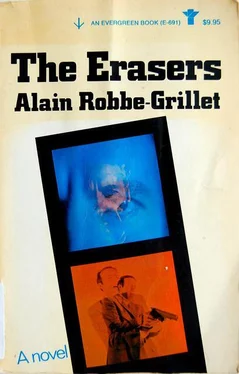Alain Robbe-Grillet - The Erasers
Здесь есть возможность читать онлайн «Alain Robbe-Grillet - The Erasers» весь текст электронной книги совершенно бесплатно (целиком полную версию без сокращений). В некоторых случаях можно слушать аудио, скачать через торрент в формате fb2 и присутствует краткое содержание. Жанр: Криминальный детектив, на английском языке. Описание произведения, (предисловие) а так же отзывы посетителей доступны на портале библиотеки ЛибКат.
- Название:The Erasers
- Автор:
- Жанр:
- Год:неизвестен
- ISBN:нет данных
- Рейтинг книги:4 / 5. Голосов: 1
-
Избранное:Добавить в избранное
- Отзывы:
-
Ваша оценка:
- 80
- 1
- 2
- 3
- 4
- 5
The Erasers: краткое содержание, описание и аннотация
Предлагаем к чтению аннотацию, описание, краткое содержание или предисловие (зависит от того, что написал сам автор книги «The Erasers»). Если вы не нашли необходимую информацию о книге — напишите в комментариях, мы постараемся отыскать её.
The Erasers — читать онлайн бесплатно полную книгу (весь текст) целиком
Ниже представлен текст книги, разбитый по страницам. Система сохранения места последней прочитанной страницы, позволяет с удобством читать онлайн бесплатно книгу «The Erasers», без необходимости каждый раз заново искать на чём Вы остановились. Поставьте закладку, и сможете в любой момент перейти на страницу, на которой закончили чтение.
Интервал:
Закладка:
It is nervousness that makes Wallas lose the rest of his discretion. He leans down and touches the man’s wrist, trying to find his pulse. The hand releases the heavy revolver and dangles limply in his grasp. The pulse has stopped. The man i certainly dead.
Wallas decides he must look through the corpse’s pockets (For what?) Only the right overcoat pocket is accessible. H‹ thrusts in his hand and removes a pair of spectacles, one o whose lenses is very dark and the other much lighter.
“Can you say whether it was the right lens that was darker or the left?”
The left lens…on the right side…The right lens on the left side…
It is the left lens that is darker. Wallas puts the glasses on the floor and straightens up. He does not want to continue the search. He feels instead like sitting down. He is very tired.
In self-defense. He saw the man aiming at him. He saw the finger squeezing the trigger. He perceived the considerable interval of time it took him to react and fire back. He was sure tie didn’t have very quick reflexes.
Yet he had to admit that he fired first. He didn’t hear the other revolver fire before his own; and if the two explosions had occurred at exactly the same moment, there would be some trace of the stray bullet on the wall or in the backs of the books. Wallas raises the window curtain: the panes are also intact. His adversary did not have time to fire.
It is only the tension of his senses that gave him, at the time, that impression of slow motion.
Wallas presses his palm against the muzzle of his gun; it feels distinctly warm. He turns back toward the body and leans down to touch the abandoned revolver. It is quite cold. Taking a better look, Wallas realizes that the left sleeve of the overcoat is empty. He feels the shape of the arm under the material. Was this arm in a sling? “A flesh wound in the arm.”
He must inform Laurent. From now on this is a matter for the police. The special agent cannot continue to handle the case alone, now that there is a corpse.
The commissioner will not be at his office this late. Wallas looks at his watch; it shows seven thirty-five. Then he remembers that it had stopped at seven-thirty. He raises it to his ear and hears the faint ticking. It must be the detonation that has started it going again-or else the shock, if he bumped it when he threw himself to the floor. He will call the commissioner at his office; if he is no longer there, someone can certainly tell Wallas where to find him. He has noticed a telephone in the bedroom.
The door is open. The light is on. The drawer of the night; able is wide open. The revolver is no longer there.
Wallas picks up the receiver. Number 124-24. “It’s a direct line.” The ringing at the other end of the line is interrupted at once.
“Hello!” a distant voice says.
“Hello, this is Wallas, it’s…”
“Oh good, I just tried to call you. This is Laurent speaking. I’ve made a discovery-you’ll never guess! Daniel Dupont! He isn’t dead at all! Do you hear me?” He repeats, separating each syllable: “Daniel Dupont is not dead!”
Then who said the telephone in the house wasn’t working?
EPILOGUE
In the dimness of the cafe the manager is arranging the tables and chairs, the ashtrays, the siphons of soda water; it is six in the morning.
The manager is not altogether awake. He is in a bad mood; he has not had enough sleep. Last night he wanted to wait until his lodger returned before locking up; but it was no use keeping awake so late, for he finally closed up all the same and went to bed without ever having seen that damned Wallas come in. He has decided that his lodger was arrested, since the police were looking for him.
Wallas has come in only this morning-ten minutes-ago-looking tired, his face drawn, hardly able to stand up. “The police called, they’re looking for you,” the manager has said as he opened the door for him. Wallas is not affected by the news; he has merely answered: “Yes, I know; thanks,” and he has gone straight upstairs to his room. Too polite to be honest. It was a good thing he had waited until six to come in: if the manager had not been up, he certainly wouldn’t have got out of bed to let him in. Besides, he’s not going to take any more lodgers, it’s too much trouble. It will be a piece of luck if this one doesn’t make trouble with all his problems.
The manager has no sooner put on the light in the cafe than in comes a little man in shabby clothes, dirty hat and an overcoat too… It’s the same one who came yesterday morning at the same time. He asks the same question as the day before:
“Monsieur Wallas, please?”
The manager hesitates, not knowing whether his lodger will find it more disagreeable to be disturbed at this moment or to miss the man who has been looking for him the last twenty-four hours. From his face, the latter does not look as if he had very good news.
“He’s upstairs, just go straight up. It’s the room at the end of the hall on the second floor.”
The little man with the woebegone face heads for the door indicated, at the rear of the cafe. The manager had not noticed yet how silent his footsteps were.
Garinati closes the door behind him. He is in a narrow hall illuminated by a vague light from the ground-glass pane above another door-opening onto the street. The staircase is opposite him. Instead of walking toward it, he follows the hallway to the door-which he opens noiselessly. He finds himself out on the sidewalk again. Wallas is upstairs, that’s all he wanted to know.
Today he won’t let him get away; he will be able to give Bona an account of his every movement. He has only too well deserved his chief’s censure and contempt these last few days. As a consequence Bona had preferred not to mention to him the execution of Albert Dupont, the wood exporter that “Monsieur Andre” had performed last night. A good job, apparently.
But Garinati’s own work has not been so bad as he had thought, after all. He has had to see his victim’s body with his own eyes to be quite certain of his death. He had been getting ideas. The shot he fired at the professor was a deadly one all right.
Bona will be annoyed when he finds out (he always finds out, sooner or later) that Garinati, instead of following the special agent, has spent the night making dangerous expeditions through all the hospitals and clinics in town, looking for the corpse of Daniel Dupont.
He has seen the dead man with his own eyes. It is the last mistake he will have made. From now on he will not be so stupid about losing his confidence in Bona. He will obey his orders without hesitation. Today: follow Wallas like a shadow. It isn’t very hard.
And it won’t be very long: Wallas will leave the city by the first train. He is sitting on the edge of his bed, his elbows on his knees, his head between his hands. He has taken off his shoes, which were hurting him; his feet are swollen from so much walking.
This sleepless night has exhausted him. He has accompanied the chief commissioner everywhere, for Laurent had at once taken charge of the case again and resumed all his duties. Several times, during their nocturnal rides, Wallas fell asleep in the car. Now that he had recovered the missing corpse, Laurent was, on the contrary, quite at ease: he has displayed an energy which his one-day colleague scarcely expected from him-particularly after eight-thirty, when he learned of the murder of the millionaire exporter.
Wallas, on the other hand, has no longer concerned himself with anything. He has stayed on because no one had told him to leave.
When he telephoned the Bureau, Fabius himself answered. Wallas has reported on his case and asked if he could be transferred back to his old department. This was taking the initiative, for he certainly would not have been kept on at this delicate post after such an unfortunate incident. Since the court does not need him for the moment, he will return to the capital during the morning.
Читать дальшеИнтервал:
Закладка:
Похожие книги на «The Erasers»
Представляем Вашему вниманию похожие книги на «The Erasers» списком для выбора. Мы отобрали схожую по названию и смыслу литературу в надежде предоставить читателям больше вариантов отыскать новые, интересные, ещё непрочитанные произведения.
Обсуждение, отзывы о книге «The Erasers» и просто собственные мнения читателей. Оставьте ваши комментарии, напишите, что Вы думаете о произведении, его смысле или главных героях. Укажите что конкретно понравилось, а что нет, и почему Вы так считаете.












